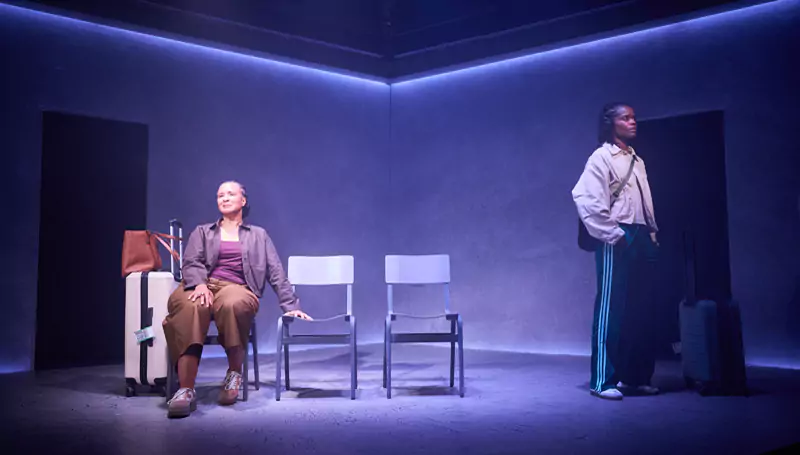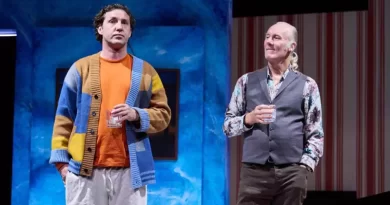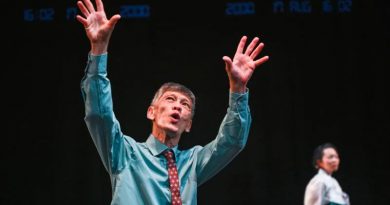“Not Your Superwoman” at Bush Theatre
Jeremy Malies in West London
16 September 2025
★★★★
Emma Dennis-Edwards deals with the experiences of a black working-class child at a private school in her screenplay for the 2023 television drama Consent. The theme is present in this daughter, mother, grandmother drama set in an airport terminal, the cabin of a jetplane and on the island of Guyana.
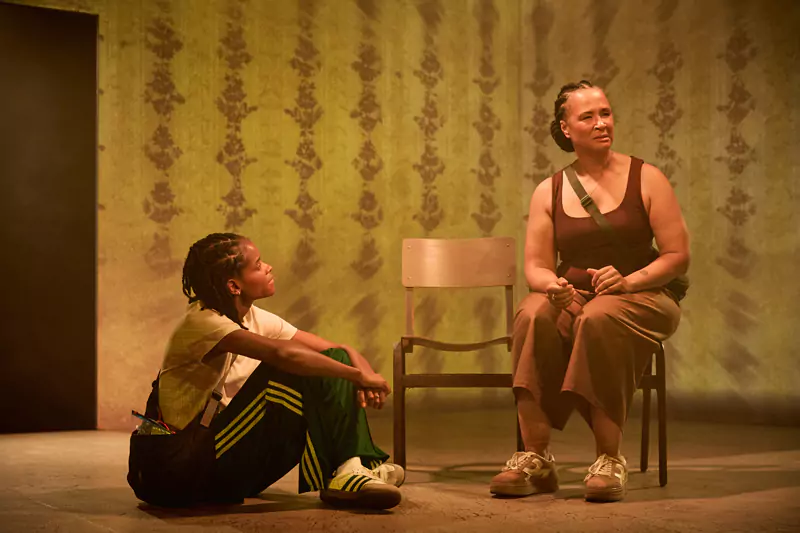
Letitia Wright and Golda Rosheuvel.
Photo credit Richard Lakos.
That is too literal as a summary of the scenes in this subtle play which is to an extent set in the memories of the protagonists. The true exploration is into lineage and the need to honour women in your family who have made sacrifices on your behalf. There is also much about parenting.
Joyce (Golda Rosheuvel of Bridgerton fame) is a 55-year-old mother to early-thirties Erica (Letitia Wright). They fly from London to Guyana where Joyce was born after her mother, Elaine, had an adulterous fling with an islander. Elaine is also on the flight though not in the way she might have hoped; her ashes are in three cellophane zip bags.
The play is set in 2025 and has multiple flashbacks with both actors stepping out of their main roles to play Elaine. The piece is of interest on account of its form which occasionally sees one flashback slide straight into another. We note synergies across the time schemes as well as ironies with characters faring quite well in life though never carrying all before them.
As a demanding exercise in which she must age 40 years while being her character’s grandmother, the play is a triumph for Wright whose recent work includes Mangrove, part of the Steve McQueen miniseries Small Axe about Black activism in late 1960s London. It deals with the same events and indeed the same real-life figures as those in Black Power Desk which is currently playing at Brixton House. Wright’s technical resources are dizzying. She and Rosheuvel are both British-Guyanese meaning that they set a tone of authenticity and cultural integrity from the off.
But does the play really warrant what I consider to be the turbo-charged Rolls-Royce engine that is the directorial talent of Lynette Linton? Dennis-Edwards’s writing abilities (both recent work and likely quality of future output) have seen her be under commission from Cardboard Citizens and Clean Break. The companies have recognized her skill with narratives that are anchored in specific and pressing economic issues and her avoidance of stereotypical roles as the social points are made.
And yet some of the gags are woefully lame. “She’s not late because she’s Black. She’s late because she’s fucking inconsiderate …” is one of Joyce’s first quips. Really! There is also a woeful running gag about how the name of Erica’s fiancé should be pronounced.
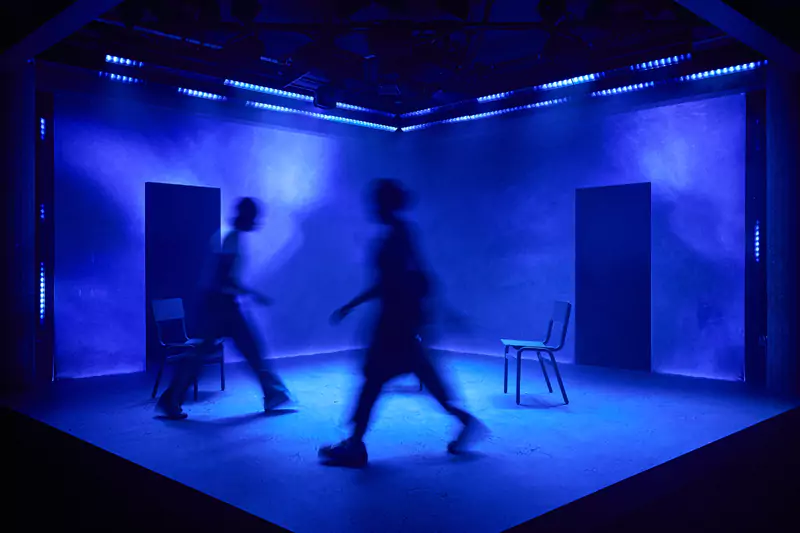
Photo credit Richard Lakos.
The humour gets better, and we laugh in the right way at Erica’s Gen Z shortcomings as she describes a TikTok video as “a documentary”. Joyce’s conviction that she can regard all stories in Metro as having come down on tablets of stone is amusing as is the snobbery that the women show over what class one is in for a long-haul flight. Even I laughed (and I took some time to get onboard in every sense) at Joyce’s stupefaction at the fact that a notable rapper travelling in business class might be white.
Technically the production is excellent. Linton steers the creative team such that we are transported for the many flashbacks by gauzy dreamlike effects in both video design (Gino Ricardo Green) and lighting (Jai Morjaria). Green moves us from airport lounge to island hotel to London housing estate with little more than deft representation of tiles and wallpaper. At one point there is an abstract flurry of what I took to be Nineties newspaper cuttings. Green has his true moment as the pair scatter the matriarch’s ashes over a waterfall, and the real-life vista is stunning. There is a saturated and blurry quality to the lighting as Joyce stumbles through her early memories of a Guyanese childhood.
The success of female ancestral lines and building on the legacy of strong women who have gone before you on the island is a major theme. But Elaine, Joyce and even Erica have been fighting uphill battles. There is a legend that after Elaine’s bout of “jiggy” with a married man, the enraged wife put a curse on the adulteress’s whole female line. The text explores the West African/Caribbean Obeah tradition of witchcraft, bad omens and achieving justice after a real or perceived slight.
With Linton’s father also being Guyanese the story and folklore belong indisputably to cast and technical team. Linton is of course returning to a venue where she was a successful artistic director for six years. She shows discipline throughout and while the seaplane flight that leads to the waterfall is a notable sequence that could be expansive, the director is aware that in reality this play is taking place on the smaller canvas of the women’s minds.
The play has much to say about the quandary of wanting to earn good money in order to educate your children privately but being time-poor as a result and, in this case, receiving a reprimand. “I don’t want to go to summer camp. Why can’t she just look after me like a normal mum? What is wrong with her?”
I did tire of the fact that men are shown as either cyphers or manipulators, this being an unremitting view. The play reads better off the page than my experience of it as an audience member. This may be down to Rosheuvel who could have found more light and shade and certainly a few more gears and gestures while being her core character of Joyce. The swearing was a low point for me in so far as its tempo and delivery could have been modulated. Saying this, while Dennis-Edwards may be already accomplished, she still does not have, say, debbie tucker green’s ability to weave expletives into fully idiomatic dialogue.
Late on, in a flashback to 2022, we see the fatally ill Elaine tell Erica that she wants to go back to Guyana when we have just seen that trip and know that it was largely successful. I wonder what Harold Pinter, master of backward chronology, would have made of that technique. As in Betrayal, there is an adulterous affair at the heart of this play, and we move backwards with the roots of the family being explored in a cemetery in Guyana towards the end.
There are many moments of intensity and tenderness, notably as Erica oils and braids Elaine’s hair. I gulped as Erica described breathing in sync with her dying grandmother right up until the elder woman’s breathing stopped. And the language can be lyrical. I think of Elaine describing the waves of charisma exuded by the ne’er do well man who would be Joyce’s father.
This is an impressive play by a writer of great promise who has tapped into the timeless theme of elders speaking to younger generations.

